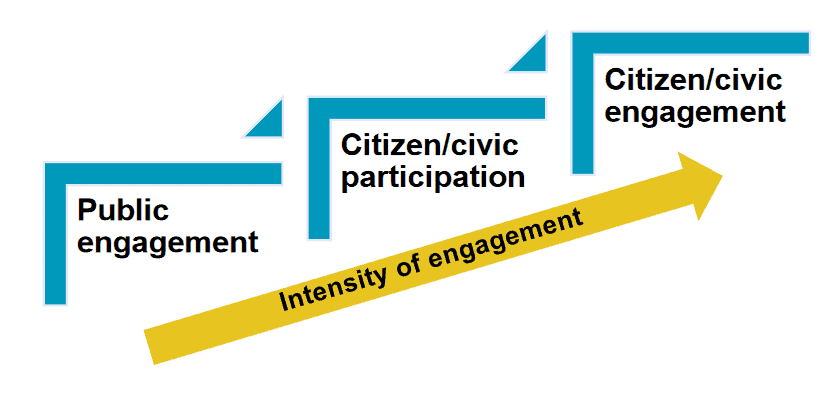Have you ever reflected about the role citizens and societies can play in transnational cooperation?
In January 2024, Interact published a new study on the engagement of civic and civil society in Interreg programmes. The report contains information and practical advice to strengthen this engagement and take it even further.
Aim of the study is exploring the dynamics of civic and civil society engagement in Interreg programmes. The report offers reflections about the potential of Interreg in fostering community engagement and strengthening Interreg for impactful cooperation with citizens and civil society organizations. The study takes into account all the Interreg programmes, included Alpine Space, and sums up very notable trends across the programmes, regarding civil society engagement.
Civic and civil society engagement is more than a ‘nice extra’
(Interact)
The focus is on active engagement of civil society in decision-making that concerns issues of public interest. Three pillars of engagement are identified by the OECD:
- Information: providing information on an issue
- Consultation: seeking feedback on a project/programme
- Engagement: building a community of citizens/stakeholders to engage with and participate in decision-making
When it comes to engagement, a clear understanding of its different forms is crucial:
- Public engagement: the ways in which the public engages with government (e.g. public announcements, lobbying, protests, collaborative decision-making)
- Civic participation: can come from citizens only, in a bottom-up logic (e.g. initiatives, petitions, public interest groups, voting).
- Civic engagement: requires an active and intentional dialogue between citizens and public decision makers.

What are the main findings the study?
- The pivotal role of citizens and civil society organisation (CSO) engagement in shaping policies is widely recognised as a means to build trust, accountability, and informed decisions.
- Civic and civil society engagement have a sound relevance in Interreg programmes, as they aim to find solutions in areas that directly affect the lives of citizens (health, environment, research, education, transport, energy).
- Programmes can continue their successes in engaging civic and civil society organisations: civil society organisations may participate as partners in projects, while both CSO and citizens can be effectively engaged in project activities driven by topics directly relevant to their local surroundings.
- Simplification remains an ongoing challenge with particular relevance to CSO and civic engagement.
- To advance civic engagement more support would be required (e.g. a strong policy commitment from the European Commission).
The role of Alpine Space programme
For Alpine Space, collaborative links beyond the programme can extend and open additional opportunities for engagement: programme’s connection with EUSALP and the Alpine Convention is crucial for integrating the programme into civil society.
Beyond projects, links to initiatives like the EUSALP Youth Council are also important: the Youth Council provides a platform for institutional involvement of young people in all EUSALP bodies. In the 2021-27 period, the Alpine Space programme launched the Youth Ambassadors Initiative to involve young people in projects implementation. The programme also encourages lead partners to involve young people in the project teams through the Initiative.
Alpine Space´s long-term goal is strengthening the consideration of citizens and civic engagement in project, in particular:
- Create guidelines within the programme manual, providing partners with insights on how to effectively involve citizens and stakeholders in discussions.
- Improve multi-level governance, focusing on cross-sectoral innovative projects and empowerment of the communities and a stronger involvement of the civil society. Priority 4 (Cooperatively managed and developed Alpine region) is the right starting point to pursue this objective.
Read the full report here



